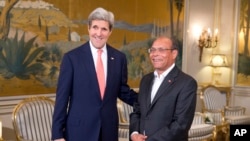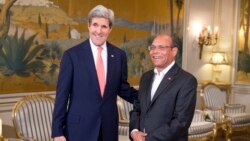Secretary of State John Kerry made a recent unannounced visit to Tunisia [February 18] to meet with senior officials to discuss progress Tunisia has made in democratic reform.
Tunisia was the birthplace of the Arab Spring, when Tunisian street vendor Mohamed Bouazizi, fed up with government corruption and harassment, set himself on fire in 2010. The protests that followed his death led to the resignation of long term Tunisian President Zine el Abidine Ben Ali, and inspired demonstrations against authoritarian governments throughout the region.
At a press briefing in Tunis, Secretary Kerry praised the progress toward democracy Tunisia has made over the last three years. “The Tunisian people have ratified a new constitution, a constitution that is rooted in democratic principles – equality, freedom, security, economic opportunity, and the rule of law,” said Mr. Kerry.
“It is a constitution that underscores Tunisia’s long tradition of respect for the rights of women and minorities. It is a constitution that will allow the people of Tunisia to realize the aspirations of Mohamed Bouazizi and millions of others. And it is a constitution that can serve as a model for others in the region and around the world.”
Mr. Kerry promised that the United States will continue to stand beside Tunisia, and reiterated the US support of the electoral process “to make certain that Tunisians have an opportunity…to exercise the rights they had fought for [so] hard and be able to vote for their future government soon.”
In addition, the United States has committed more than $400 million in foreign assistance for Tunisia’s transition to support the country’s security, stability, economic growth, and political reform as the bilateral engagement between the U.S. and Tunisia is strengthened.
Secretary of State Kerry said our two countries are taking steps to strengthen their people-to-people programs, including educational exchanges; and he announced that the inaugural meeting of the U.S.–Tunisia Strategic Dialogue will take place when Prime Minister Mehdi Jomaa comes to Washington D.C. at President Barack Obama’s invitation in the coming months.
“The work of building democracy is hard work,” said Secretary Kerry. “Í know this is a path that Tunisia wants to go down and wants to be successful at. I wanted to come here…to confirm on behalf of the American people and President Obama our commitment to stand with Tunisia, with the people of Tunisia, to help move down this road to democracy.”
Tunisia was the birthplace of the Arab Spring, when Tunisian street vendor Mohamed Bouazizi, fed up with government corruption and harassment, set himself on fire in 2010. The protests that followed his death led to the resignation of long term Tunisian President Zine el Abidine Ben Ali, and inspired demonstrations against authoritarian governments throughout the region.
At a press briefing in Tunis, Secretary Kerry praised the progress toward democracy Tunisia has made over the last three years. “The Tunisian people have ratified a new constitution, a constitution that is rooted in democratic principles – equality, freedom, security, economic opportunity, and the rule of law,” said Mr. Kerry.
“It is a constitution that underscores Tunisia’s long tradition of respect for the rights of women and minorities. It is a constitution that will allow the people of Tunisia to realize the aspirations of Mohamed Bouazizi and millions of others. And it is a constitution that can serve as a model for others in the region and around the world.”
Mr. Kerry promised that the United States will continue to stand beside Tunisia, and reiterated the US support of the electoral process “to make certain that Tunisians have an opportunity…to exercise the rights they had fought for [so] hard and be able to vote for their future government soon.”
In addition, the United States has committed more than $400 million in foreign assistance for Tunisia’s transition to support the country’s security, stability, economic growth, and political reform as the bilateral engagement between the U.S. and Tunisia is strengthened.
Secretary of State Kerry said our two countries are taking steps to strengthen their people-to-people programs, including educational exchanges; and he announced that the inaugural meeting of the U.S.–Tunisia Strategic Dialogue will take place when Prime Minister Mehdi Jomaa comes to Washington D.C. at President Barack Obama’s invitation in the coming months.
“The work of building democracy is hard work,” said Secretary Kerry. “Í know this is a path that Tunisia wants to go down and wants to be successful at. I wanted to come here…to confirm on behalf of the American people and President Obama our commitment to stand with Tunisia, with the people of Tunisia, to help move down this road to democracy.”

















